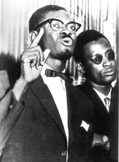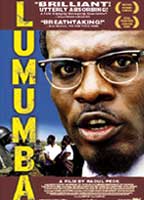FILM NOTES
FILM NOTES INDEX
NYS WRITERS INSTITUTE
HOME PAGE

(French/Belgian/German/Haitian, 2000, 115 minutes, color, 35mm)
In French with English subtitles
Directed by Raoul Peck
Cast:
Eriq Ebouaney . . . . . . . . . . Patrice Lumumba
Alex Descas . . . . . . . . . . Joseph Mobutu
Théophile Sowié . . . . . . . . . . Maurice Mpolo
Maka Kotto . . . . . . . . . . Joseph Kasa Vubu
The
following film notes were prepared for the New York State Writers
Institute by Kevin Jack Hagopian, Senior Lecturer in Media Studies
at Pennsylvania State University:
The scramble for Africa was over. The old colonial powers in Africa, Belgium, France, Germany, England, were exhausted by World War II, and the costs of policing their far-flung empires had become prohibitive. Then too, freedom's voice was being heard in a new generation of articulate, courageous leaders who were shaping nationalist movements across the continent. There was Jomo Kenyatta. There was Nelson Mandela. And there was Patrice Lumumba.
 Lumumba would write the history of a new nation, Congo, on the ruins of the old Belgian Congo, perhaps the most deadly and corrupt of all the European possessions in Africa. Once, it had been owned - actually personally owned - by King Leopold II of Belgium. The country was his fiefdom, to loot and plunder of its natural resources. His depredations so outraged the world at the turn of the 20th century that Mark Twain had helped to keynote an international campaign against Leopold's vile rule, in what some historians have called the beginning of the modern human rights movement in the world.
Lumumba would write the history of a new nation, Congo, on the ruins of the old Belgian Congo, perhaps the most deadly and corrupt of all the European possessions in Africa. Once, it had been owned - actually personally owned - by King Leopold II of Belgium. The country was his fiefdom, to loot and plunder of its natural resources. His depredations so outraged the world at the turn of the 20th century that Mark Twain had helped to keynote an international campaign against Leopold's vile rule, in what some historians have called the beginning of the modern human rights movement in the world.
But it took many years for the machine of Belgian colonialism to fully rust out. When it did, in the 1950's, a power vacuum appeared. Into that vacuum flowed two of the most mesmerizing political figures in modern African history, the brilliant and idealistic Patrice Lumumba, and the Machiavellian former employee of the Belgian administration, Joseph Mobutu. Lumumba would rise to power quickly, and just as quickly, be deposed, and then hideously executed. His one-time rival, Mobutu, had helped to orchestrate Lumumba's assassination, with the help of the CIA. He would reconstitute himself as Mobutu Sese Seko, and rule Congo (which he renamed Zaire) as a bloody-handed tyrant for decades. His exile in the 1990's left the country even more prostrate than at the moment of independence.
Lumumba's brief life has been shrouded in mystery, and his extraordinary lessons of modern nationalism overshadowed by the murky story of his last months. Director Raoul Peck's epic biography of the charismatic leader begins with those horrific last hours, and works its way back into the past.
 Roaul Peck was born in Port-au-Prince, Haiti, a country undergoing its own agonies of political tyranny. In 1961 his parents, like many intellectuals, fled the Duvalier dictatorship. In the Republic of Congo, they made a new home, just two years after Patrice Lumumba had been slaughtered at the airport in Katanga. Peck attended school in Leopoldville, and though he became a citizen of the world, telling Lumumba's story, of hope raised up and then destroyed, became a personal obsession. That obsession stayed with him during his training in Germany as an economist and an engineer, and later, in New York, it sustained him during his year as a cab driver. Peck's time at film school in Germany saw him incubate the Lumumba project; it first saw the screen as an award-winning feature-length documentary, 1992's Death of a Prophet. The director of several other short films and features, Peck has remained firm in his desire to tell Lumumba's story truthfully, with all the drama and fervor of Lumumba's too-short life intact. He has been dismayed, though, at the climate of cynicism that has greeted those who would finally tell the true, harrowing stories of the African independence movements of forty years ago:
Roaul Peck was born in Port-au-Prince, Haiti, a country undergoing its own agonies of political tyranny. In 1961 his parents, like many intellectuals, fled the Duvalier dictatorship. In the Republic of Congo, they made a new home, just two years after Patrice Lumumba had been slaughtered at the airport in Katanga. Peck attended school in Leopoldville, and though he became a citizen of the world, telling Lumumba's story, of hope raised up and then destroyed, became a personal obsession. That obsession stayed with him during his training in Germany as an economist and an engineer, and later, in New York, it sustained him during his year as a cab driver. Peck's time at film school in Germany saw him incubate the Lumumba project; it first saw the screen as an award-winning feature-length documentary, 1992's Death of a Prophet. The director of several other short films and features, Peck has remained firm in his desire to tell Lumumba's story truthfully, with all the drama and fervor of Lumumba's too-short life intact. He has been dismayed, though, at the climate of cynicism that has greeted those who would finally tell the true, harrowing stories of the African independence movements of forty years ago:
"I sometimes think that this film comes 50 years too early. Today, so many people are weary of politics, of Africa, of the Third World, of the struggles… Others don't want to think or argue, to be done with it, or better yet, to forget it all. When I was 12, I would like to have seen a film like this one, but none existed. Through the complexity of this story, my sincerest wish is that we will no longer be able to say, "I don't know."
— Kevin Hagopian, Penn State University
For additional information, contact the Writers Institute at 518-442-5620 or online at https://www.albany.edu/writers-inst.
 Lumumba
Lumumba